#education policy changes 2025
Explore tagged Tumblr posts
Text
Education Policy Overhaul: Project 2025's Vision for Federal Role in Schools
As a classroom teacher, I approach Project 2025’s proposed overhaul of education policy with a deep sense of concern. While the vision promises to reconfigure the federal role in schools with an emphasis on local control and more market-driven solutions, the reality of such changes may undermine the very foundation of public education and widen disparities across communities. One of the central…

View On WordPress
#education policy changes 2025#education policy vision Project 2025#federal education policy 2025#federal role in education#future of federal education leadership#impact of Project 2025 on schools#Project 2025 education reform#Project 2025 school funding policies#Project 2025 school systems#reforming federal education programs#U.S. education overhaul 2025#U.S. education system transformation
0 notes
Text
#ustralia international student cap 2025#new Australian visa policy#impact on international students#student visa changes#Australia immigration policy#Punjabi Australian news#student enrolment cap#education providers in Australia#Australia higher education policy#Australian punjabi news channel#radio station Melbourne#Radio haanji#Indian radio stations sydney#Australian radio stations in Punjabi#Punjabi Australian News#Australia Indian radio station#Indian radio stations sydney
0 notes
Text
Here's the top 2 stories from each of Fix The News's six categories:
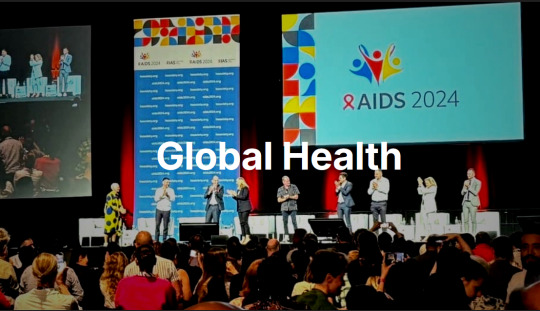
1. A game-changing HIV drug was the biggest story of 2024
In what Science called the 'breakthrough of the year', researchers revealed in June that a twice-yearly drug called lenacapavir reduced HIV infections in a trial in Africa to zero—an astonishing 100% efficacy, and the closest thing to a vaccine in four decades of research. Things moved quick; by October, the maker of the drug, Gilead, had agreed to produce an affordable version for 120 resource-limited countries, and by December trials were underway for a version that could prevent infection with just a single shot per year. 'I got cold shivers. After all our years of sadness, particularly over vaccines, this truly is surreal.'
2. Another incredible year for disease elimination
Jordan became the first country to eliminate leprosy, Chad eliminated sleeping sickness, Guinea eliminated maternal and neonatal tetanus, Belize, Jamaica, and Saint Vincent & the Grenadines eliminated mother-to-child transmission of HIV and syphilis, India achieved the WHO target for eliminating black fever, India, Viet Nam and Pakistan eliminated trachoma, the world’s leading infectious cause of blindness, and Brazil and Timor Leste eliminated elephantiasis.
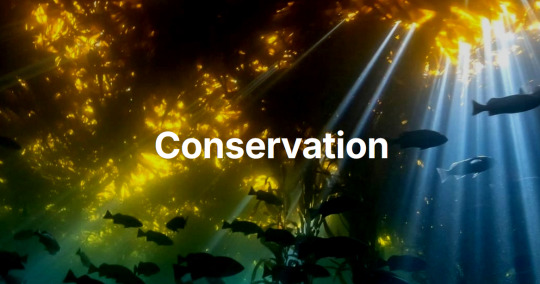
15. The EU passed a landmark nature restoration law
When countries pass environmental legislation, it’s big news; when an entire continent mandates the protection of nature, it signals a profound shift. Under the new law, which passed on a knife-edge vote in June 2024, all 27 member states are legally required to restore at least 20% of land and sea by 2030, and degraded ecosystems by 2050. This is one of the world’s most ambitious pieces of legislation and it didn’t come easy; but the payoff will be huge - from tackling biodiversity loss and climate change to enhancing food security.
16. Deforestation in the Amazon halved in two years
Brazil’s space agency, INPE, confirmed a second consecutive year of declining deforestation in the Brazilian Amazon. That means deforestation rates have roughly halved under Lula, and are now approaching all time lows. In Colombia, deforestation dropped by 36%, hitting a 23-year low. Bolivia created four new protected areas, a huge new new state park was created in Pará to protect some of the oldest and tallest tree species in the tropical Americas and a new study revealed that more of the Amazon is protected than we originally thought, with 62.4% of the rainforest now under some form of conservation management.
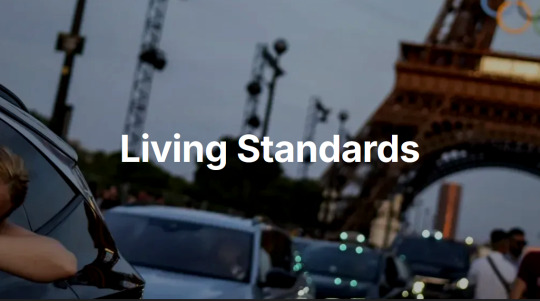
39. Millions more children got an education
Staggering statistics incoming: between 2000 and 2023, the number of children and adolescents not attending school fell by nearly 40%, and Eastern and Southern Africa, achieved gender parity in primary education, with 25 million more girls are enrolled in primary school today than in the early 2000s. Since 2015, an additional 110 million children have entered school worldwide, and 40 million more young people are completing secondary school.
40. We fed around a quarter of the world's kids at school
Around 480 million students are now getting fed at school, up from 319 million before the pandemic, and 104 countries have joined a global coalition to promote school meals, School feeding policies are now in place in 48 countries in Africa, and this year Nigeria announced plans to expand school meals to 20 million children by 2025, Kenya committed to expanding its program from two million to ten million children by the end of the decade, and Indonesia pledged to provide lunches to all 78 million of its students, in what will be the world's largest free school meals program.

50. Solar installations shattered all records
Global solar installations look set to reach an unprecedented 660GW in 2024, up 50% from 2023's previous record. The pace of deployment has become almost unfathomable - in 2010, it took a month to install a gigawatt, by 2016, a week, and in 2024, just 12 hours. Solar has become not just the cheapest form of new electricity in history, but the fastest-growing energy technology ever deployed, and the International Energy Agency said that the pace of deployment is now ahead of the trajectory required for net zero by 2050.
51. Battery storage transformed the economics of renewables
Global battery storage capacity surged 76% in 2024, making investments in solar and wind energy much more attractive, and vice-versa. As with solar, the pace of change stunned even the most cynical observers. Price wars between the big Chinese manufacturers pushed battery costs to record lows, and global battery manufacturing capacity increased by 42%, setting the stage for future growth in both grid storage and electric vehicles - crucial for the clean flexibility required by a renewables-dominated electricity system. The world's first large-scale grid battery installation only went online seven years ago; by next year, global battery storage capacity will exceed that of pumped hydro.
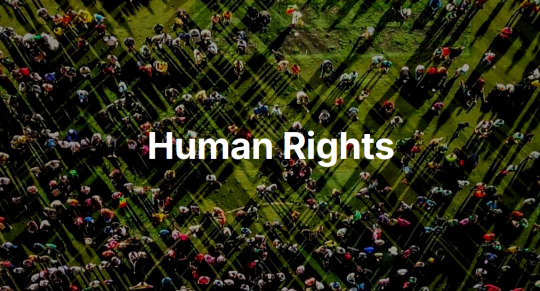
65. Democracy proved remarkably resilient in a record year of elections
More than two billion people went to the polls this year, and democracy fared far better than most people expected, with solid voter turnout, limited election manipulation, and evidence of incumbent governments being tamed. It wasn't all good news, but Indonesia saw the world's biggest one day election, Indian voters rejected authoritarianism, South Korea's democratic institutions did the same, Bangladesh promised free and fair elections following a 'people's victory', Senegal, Sri Lanka and Botswana saw peaceful transfers of power to new leaders after decades of single party rule, and Syria saw the end of one of the world's most horrific authoritarian regimes.
66. Global leaders committed to ending violence against children
In early November, while the eyes of the world were on the US election, an event took place that may prove to be a far more consequential for humanity. Five countries pledged to end corporal punishment in all settings, two more pledged to end it in schools, and another 12, including Bangladesh and Nigeria, accepted recommendations earlier in the year to end corporal punishment of children in all settings. In total, in 2024 more than 100 countries made some kind of commitment to ending violence against children. Together, these countries are home to hundreds of millions of children, with the WHO calling the move a 'fundamental shift.'

73. Space exploration hit new milestones
NASA’s Europa Clipper began a 2.9 billion kilometre voyage to Jupiter to investigate a moon that may have conditions for life; astronomers identified an ice world with a possible atmosphere in the habitable zone; and the James Webb Telescope found the farthest known galaxy. Closer to Earth, China landed on the far side of the moon, the Polaris Dawn crew made a historic trip to orbit, and Starship moved closer to operational use – and maybe one day, to travel to Mars.
74. Next-generation materials advanced
A mind-boggling year for material science. Artificial intelligence helped identify a solid-state electrolyte that could slash lithium use in batteries by 70%, and an Apple supplier announced a battery material that can deliver around 100 times better energy density. Researchers created an insulating synthetic sapphire material 1.25 nanometers thick, plus the world’s thinnest lens, just three atoms across. The world’s first functioning graphene-based semiconductor was unveiled (the long-awaited ‘wonder material’ may finally be coming of age!) and a team at Berkeley invented a fluffy yellow powder that could be a game changer for removing carbon from the atmosphere.
-via Fix The News, December 19, 2024
#renumbered this to reflect the article numbering#and highlight just how many stories of hope there are#and how many successes each labeled story contains#2024#good news#hope#hope posting#hopeposting#hopepunk#conservation#sustainability#public health#energy#quality of life#human rights#science and technology
3K notes
·
View notes
Text
Things the Biden-Harris Administration Did This Week #37
Oct 4-11 2024
President Biden announced a new EPA rule that will require all lead pipes in America's drinking water systems to be replace with-in 10 years. This builds on the $15 billion the Biden-Harris Administration has already invested in replacing lead pipes nation wide. The administration's focus on this issue has allowed local governments to greatly execrate their lead pipe replacement plans, before Biden took office the city of Milwaukee's timeline for replacing its lead pipes was 60 years, they're now on track to do it in 10. The EPA says there's no safe level of lead in the human body.
Vice President Harris announced she plans to expand Medicare to cover home health care. Currently those who need long term care, are covered by Medicaid, the health program for the poor so have to spend all their savings before they can qualify. This change would allow more seniors to stay in their homes and offer support to caregiving family members. Medicare also covers the disabled thus proving a game changer for the disabled Americans and their families. The Vice President also endorsed expanding Medicare to cover the costs of hearing and vision care.
Medicare released a preliminary list of 101 generic drugs which it would cover that would cost no more than $2 for a month for enrollees. People have long lobbied to allow Medicare to pay for generic drugs which has been resisted by drug companies. Thanks to President Biden's Inflation Reduction Act, and in line with a Biden Executive Order Medicare is now working on bring low cost generic drugs to seniors. The list targets some of the most common prescriptions thus will bring savings to the most people.
Domestic Policy Advisor Neera Tanden announced that the Biden-Harris Administration had blown past its goal of hiring 250,000 student support staff for 2024. The joint effort by the Department of Education, AmeriCorps and Everyone Graduates Center managed to hire 320,000 tutors, mentors, student success coaches, postsecondary transition coaches, and student support coordinators nationwide, its goal for the end of 2025.
The Department of Housing and Urban Development announced $420 million to help get rid of lead paint and other lead hazards from homes. HUD estimates that over 3 million households that have children under the age of 6 live with lead hazards. HUDs grants will go to all 50 states, DC, and Puerto Rico with particular focus on low income housing.
#Thanks Biden#Joe Biden#kamala harris#drug prices#medicare#lead#lead poisoning#students#politics#US politics#American politics
3K notes
·
View notes
Text
ok: let me be very REALISTIC about project 2025. if youre on the same page that project 2025 is insane and would have massive implications for your life, and you're worried, read this post.
important considerations
the "project 2025" for trumps last term only had about 2/3rds pass rate, and was much less extreme than the current agenda
after the last trump administration, or during, a good chunk of the most extreme was undone or overturned by the courts or legislature (paris accords, trans kids in sports)
organizations like the aclu have already committed to continuing their work of the first trump administration, where they alone entered 434 legal challenges and overturned some of trumps most extreme policies (muslim ban, family separation)
lets also not forget the shadow of the last 8 years of the republican party, their extremist infighting cost them tons of priorities when they had majorities
do not forget trump is also spectacular at alienating his competent aides and replacing them with more loyal, but much less experienced and competent staff
what i want you to take away
it is beyond reasonable to be afraid, confused, and angry. life will change for the worse in america.
you should be preparing plans for your safety with your doctors, family, and friends. explore your healthcare, housing, education, and employment options to the fullest extent
it is very unlikely that project 2025, especially its most extremist plans, will be implemented in their entirety. no government is a perfect law passing machine. advocacy groups are laying down and dying until 2028.
take a deep breath, make some appointments, and take care of yourself
#us politics#project 2025#lgbtq#election 2024#feminism#blm#hastily made this over my morning tea#if youre gonna be a doomer on this post just dont
770 notes
·
View notes
Text
Jan. 27, 2025, 1:00 PM MST
By Laura Strickler
A group of Quaker congregations is suing the Department of Homeland Security for changing a policy that prevented Immigration and Customs Enforcement agents from carrying out operations in so-called “sensitive locations” such as houses of worship, playgrounds, schools and hospitals without approval from supervisors.
The policy, which had been in place under multiple administrations — including during President Donald Trump’s first term — was rescinded last week.
The lawsuit, which was filed in federal district court in Maryland on Monday, alleges, “The very threat of that [immigration] enforcement deters congregants from attending services, especially members of immigrant communities,” and argues that attending religious services is at the heart of the “guarantee of religious liberty.”
Faith leaders, local officials and educators have objected to the policy reversal and have been vocal about their opposition, but the suit appears to be the first from a faith-based organization challenging the change in court.
“A week ago today, President Trump swore an oath to defend the Constitution and yet today religious institutions that have existed since the 1600s in our country are having to go to court to challenge what is a violation of every individual’s constitutional right to worship and associate freely,” said Skye Perryman, president and CEO of Democracy Forward, which is providing the lawyers representing the Quaker groups.
Perryman said the lawsuit addresses more than churches that act as sanctuaries. “The troubling nature of the policy goes beyond just houses of worship with sanctuary programs — it is that ICE could enter religious and sacred spaces whenever it wants,” she said.
Noah Merrill, secretary of the New England Yearly Meeting of Friends, one of the plaintiffs in the suit, told NBC News in an email: "Quaker meetings for worship seek to be a sanctuary and a refuge for all, and this new and invasive practice tangibly erodes that possibility by creating unnecessary anxiety, confusion, and chilling of our members’ and neighbors’ willingness to share with us in the worship which sustains our lives. This undermines our communities and, we believe, violates our religious freedom."
According to the lawsuit, the policy that protected “sensitive locations” from immigration enforcement without prior approval dates back to the early 1990s. It was meant to allow undocumented people to operate freely in certain public areas with the idea that doing so would ultimately benefit not just them, but also the larger community — for example, by allowing children to be in school during the day, and letting sick people visit hospitals without fear of deportation.
157 notes
·
View notes
Text
A comprehensive new review by experts in the sustainability science field, published in The Lancet Planetary Health, is challenging the long-held assumption that economic growth is necessary for societal progress.
The review, led by the Institute of Environmental Science and Technology of the Universitat Autònoma de Barcelona (ICTA-UAB) and titled "Post-growth: the science of wellbeing within planetary boundaries," explores the rapidly advancing field of post-growth research and presents a compelling case for prioritizing human well-being and ecological sustainability over endless economic expansion.
[...]
Key findings from the review include: The Limits to Growth: The review revisits the findings of the 1972 report "Limits to Growth," noting that the world is currently tracking the "Double Resources" scenario, where collapse is driven by pollution rather than resource scarcity. This aligns with current concerns about climate change and biodiversity loss. Decoupling is Insufficient: While relative decoupling of GDP from resource use is common, the review finds no evidence of sustained absolute and sufficient decoupling, and models suggest that it is unlikely even with optimistic assumptions about technology. Social Limits to Growth: The review finds that above a certain level of income, economic growth does not improve human well-being, and the costs of growth (e.g., pollution and social upheaval) may offset its benefits. There are diminishing returns for social outcomes such as health, education, and poverty reduction as GDP increases. Post-Growth Policies: The review highlights the development of ecological macroeconomic models that test policies for managing without growth. It discusses a range of policies to reduce growth dependencies and promote well-being, including universal basic services, working-time reductions, job guarantees, and carbon and wealth taxes. Well-being within Limits: The review emphasizes that high levels of well-being can be achieved at lower levels of resource use. It argues that focusing on public services, income equality, and democratic quality can meet human needs with much lower energy use. North-South Dynamics: The review acknowledges the unequal exchange between the Global North and the Global South, where richer countries appropriate resources and labor from poorer nations. It suggests that post-growth in high-income countries might benefit low-income countries by reducing this exploitation. However, the review notes that post-growth could also negatively affect low-income countries that are dependent on exports to high-income countries, unless low-income countries implement policy interventions towards monetary sovereignty, industrial policy and effective delinking from high-income economies.
17 January 2025
132 notes
·
View notes
Text

TWO HOLOCAUST REMEMBRANCE DAYS
There are two main Holocaust remembrance days:
Yom HaShoah, the Jewish Holocaust remembrance day, was first commemorated in 1951. It is observed on the 27th of the Hebrew month of Nisan and falls on the anniversary of the Warsaw Ghetto Uprising.
International Holocaust Remembrance Day was not established by the international community until 2005 and falls on January 27, on the anniversary of the Soviet liberation of Auschwitz-Birkenau.
These two separate commemoration days are emblematic of two very different approaches to Holocaust education: one which centers the experience of the primary victims of the Holocaust -- Jews -- and another which instead highlights the supposed saviors of the Jews.
HAS HOLOCAUST EDUCATION FAILED?
Holocaust denial, revisionism, inversion, and distortion are widespread today.
Recent surveys show deeply disturbing trends among Gen-Z; for example, a 2020 comprehensive survey by the Claims Conference found that 36% of respondents believe “less than 2 million” Jews were murdered in the Holocaust. In New York state, nearly 20% of millennials and Gen-Z believe that Jews caused the Holocaust.
Likewise, in 2023, the Claims Conference found that 23% of Dutch millennials and Gen-Z believe the Holocaust is a “myth” or “exaggerated.”
According to the latest Anti-Defamation League Global 100 survey of worldwide antisemitism (published in January of 2025), only 48% of people worldwide “recognize the Holocaust’s historical accuracy.” Among the 18-34-year-old demographic, the findings are even worse: only 39% recognize the historical accuracy of the Holocaust.
In the United States, most states do not have mandatory Holocaust education, but even when they do, there exists no standardized curriculum, which means the mandatory education often falls short.
THE PROBLEM
In the first few decades after the Holocaust, there was little interest in the Holocaust. Immediately following liberation, the world responded with shock and horror to the grotesque imagery coming out of the Nazi death camps. But then they moved on quickly, preoccupied by the Cold War and other issues.
Meanwhile, many Jewish Holocaust survivors were afraid to center -- or even talk about -- their experiences. There was great stigma and shame associated with being a Holocaust survivor, including in Israel. Many Israelis resented Holocaust survivors, (incorrectly) believing that the only way they could have possibly survived the Nazi genocide would be if they had collaborated with the Nazis (for example, as Kapos). Others (also incorrectly) resented the Jews in Europe for “not fighting back”). In Israel, this attitude only started to change after the 1961 Adolf Eichmann trial, when survivors spoke publicly of their experiences for the first time when they took the stand.
Some survivors, like famous Nazi-Hunter Simon Wiesenthal, felt that Jews should de-emphasize the intentionally antisemitic nature of the Holocaust in order to get the non-Jewish world to care. In fact, you might’ve heard that 11 million people — 6 million Jews and 5 million others — perished in the Holocaust. This is a fake figure. Frustrated by the non-Jewish world’s lack of interest in the Holocaust, Wiesenthal created a figure to de-emphasize its anti-Jewish nature, knowing that the world would likely be more interested in the plight of others. Historians who knew him say that he chose the figure carefully: 5 million was a large number, but not a number large enough to obscure the 6 million Jewish victims.
NOW, HOLOCAUST EDUCATION OFTEN UNIVERSALIZES THE HOLOCAUST
The Holocaust was the industrialized slaughter of 6 million Jews and over one million Roma and Sinti by the Nazis and their collaborators. While the Nazis targeted many groups, only Jews — and in some countries, Roma — were subject to extermination as per the policies of the Final Solution. The Holocaust destroyed 66 percent of Europe’s Jewish population over the span of less than six years.
Holocaust universalization is the tendency to treat the Holocaust as “public property,” stripping Jews of their unique experience. Instead, the Holocaust is treated as a tragedy that befell onto mankind, rather than a genocide that specifically and intentionally targeted Jews.
According to Holocaust historian Dr. Elana Heidenman, Holocaust universalization turns the Holocaust into “a joke, a mere moment in history that is no longer relevant unless through an exaggerated comparison, [and] terms of reference that have lost all depth and all substance.”
The universalization of the Holocaust erases Jews’ “right” to the memory and understanding of the Holocaust. The world largely treats the Holocaust as a “lesson to be learned,” rather than a genocide that decimated the Jewish community. How many people who invoke the Holocaust actually care about the plight of Holocaust survivors today? How many people who invoke the Holocaust are committed to unlearning their own antisemitic biases? Holocaust universalization almost inevitably always distorts basic facts about the Holocaust. It’s worth noting that Holocaust distortion is a form of Holocaust denial.
WHAT MAKES FOR EFFECTIVE HOLOCAUST EDUCATION?
(1) Effective Holocaust education must center the victims of the Holocaust. Beware of overemphasizing the experiences of saviors over the experiences of victims and survivors.
After all, arguably, for Jews, the most enduring memory of the Holocaust is that the world failed us: not just the Nazis and their collaborators, but international institutions like the Red Cross and the Vatican, our own neighbors and friends, the non-Jewish anti-Nazi resistance, and even the Allies, who ignored the urgency of our plight until it was too late.
(2) Effective Holocaust education must provide specificity and context; it’s important for students to understand the specific historic and social conditions that allowed the Holocaust to happen. Most notably, students cannot adequately comprehend the Holocaust if they do not learn about the 2000 years of systemic European antisemitism that preceded it.
(3) Beware of universalizing the Holocaust. While it’s true that he Holocaust can teach us many valuable universal lessons about issues such as intolerance, fascism, and bigotry, it shouldn’t be taught only as a moral lesson for humanity; instead, students should also learn the lesson of the dangers of unfettered antisemitism.
(4) Effective Holocaust education must prioritize primary sources over fictional accounts.
UNDERSTANDING THE CONDITIONS THAT MADE THE HOLOCAUST POSSIBLE
In order for Holocaust education to be effective, it must always strongly emphasize the antisemitism that led to the Holocaust.
You cannot divorce the Holocaust from the antisemitism that caused it. The Nazis persecuted Jews specifically based on antisemitic tropes and conspiracies that have been ingrained into the DNA of our societal institutions. The Holocaust wouldn’t have been possible without the 2000 years of antisemitism that preceded it.
The Holocaust was possible because the Nazis animated the previously-existing and sometimes dormant antisemitism of German society and the societies of the countries they conquered. There’s a reason many of the worst massacres during the Holocaust were perpetrated not by the Nazis, but by collaborators. The Jedwabne pogrom comes to mind. There’s a reason the institutions that were supposed to protect human beings — ahem, the Red Cross — chose to look away at best and collaborate at worst.
Again: without antisemitism, there wouldn’t have been a Holocaust. It’s imperative for Holocaust education to emphasize this point.
"NEVER AGAIN" MEANS UNDERSTANDING THAT THE END OF THE WAR DID NOT END ANTISEMITISM
Antisemitism did not end with World War II. In fact, after liberation, thousands of Jewish survivors were robbed and even murdered by their former neighbors in Eastern Europe when they attempted to reclaim their old homes. The first post-Holocaust pogrom was the Krakow pogrom, which took place in August of 1945. After that, pogroms spread to 11 other Polish cities.
The most infamous of these pogroms is the Kielce pogrom in 1946, when 42 Jewish refugees were murdered by a mob of Polish civilians following a blood libel. The refugees were horrifically beaten, shot, and even thrown out windows. A survivor of both the Holocaust and the Kielce pogrom later testified, “I would like to mention that as a former prisoner of concentration camps I have not gone through an experience like this. I have seen very little sadism and bestiality of this scale.”
Holocaust education that does not teach students to identify the persisting antisemitism in the world does an injustice to Holocaust victims, survivors, and the promise of “Never Again.” This includes recognizing how ancient antisemitic tropes, stereotypes, and conspiracies manifest today.
For a full bibliography of my sources, please head over to my Instagram and Patreon.
rootsmetals
“I thought in 1945 antisemitism died in Auschwitz, but I was wrong. Its victims perished, antisemitism did not.” — Holocaust survivor Elie Wiesel
111 notes
·
View notes
Text
Protecting Children from Chemical and Surgical Mutilation Executive Order
Signed January 28, 2025
This executive order does the following:
Falsely claims that medical professionals are "maiming" children.
Claims, without citation, that "countless children soon regret that they have been mutilated and begin to grasp the horrifying tragedy that they will never be able to conceive children of their own or nurture their children through breastfeeding."
Refers to the World Professional Association for Transgender Health (WPATH) as "junk science."
Instructs all federal agencies to repeal all children-related policies that rely on the WPATH's guidance.
Directs all agencies that fund medical schools and hospitals for research or education to force these schools and hospitals to stop providing gender-affirming care for children.
Gives permission to the Department of Health and Human Services to make changes to Medicaid and Medicare to stop gender-affirming care.
Cancels the “HHS Notice and Guidance on Gender Affirming Care, Civil Rights and Patient Privacy” policy signed in March of 2022.
Allows the Attorney General to revoke custody from parents who seek gender-affirming care for their children.
Ensures that federal employee health plans stop covering transgender-related surgeries and hormone treatments for children starting in 2026.
Directs the Department of Defense to change their insurance details to no longer cover surgeries or medications that alter a child's body, surgically or medically.
#fuck donald trump#trump administration#fuck trump#united states#civil rights#gender affirming care#protect trans youth#transgender#trans kids#executive orders#us politics#trump#donald trump
85 notes
·
View notes
Text
2025 Supported Org: Disability Law United
Nearly all of America’s systems – from education to healthcare to public transit – are more difficult to navigate for persons with disabilities. Although the passage of the Americans with Disabilities Act (ADA) in 1990 established a new standard of protection and support for disabled people in many spheres of public and civic life, the harsh reality is that most of these systems fall far short of what the law requires of them in terms of accommodating and supporting disabled people. The existing problems have been compounded by the United States’ widespread return to pre-COVID protocols and practices, leaving anyone who is unusually vulnerable to COVID or its aftereffects with fewer pathways through public life.

Disability Law United (formerly The Civil Rights Education and Enforcement Center) is a nonprofit legal organization that fights for liberation and equity through the lens of intersectional disability justice. Their work is informed by grassroots movements for systemic change and centers the concerns and goals of people with disabilities who are confronting barriers to accessing programs and services and resisting oppressive legal systems in the United States.
Disability Law United’s legal expertise in the disability-rights frameworks of the ADA and the Rehabilitation Act allows them to move the dial for intersectional disability justice across a variety of systems that deny the humanity, dignity, and agency of disabled people. They further their aims through a combination of public education, coalition and policy work, systemic-change litigation, direct legal services, and technical assistance to movement leaders and community-based partners, strengthening social movements and upholding human rights.
They focus on supporting and defending disabled people who are experiencing discrimination and exclusion at the intersection of other systems of harm. Their work encompasses improving access to public services and spaces, disaster and environmental justice, immigration, and incarceration and policing.
You can support Disability Law United as a creator in the 2025 FTH auction (or as a bidder, when the time comes to donate for the auctions you’ve won.)
#fth 2025#disability law united#formerly civil rights education and enforcement center#civil rights#disability rights#supported organzation#supported nonprofits
72 notes
·
View notes
Text
Hi guys! I'm here to tell you about some of the stuff Project 2025 would do to America.

Number One: Making America a Christian Nation. What this means is the separation of church and state would be gone, and Trump will implement a "Bible-based system of government". Practicing other religions could be banned.
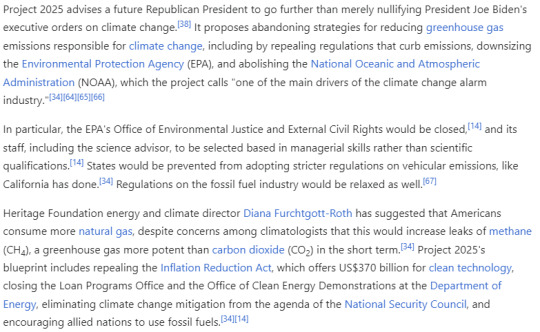
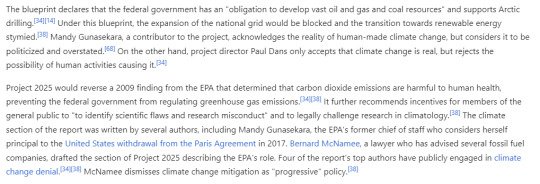
Number Two: Climate Change. Project 2025 will be completely removing most of the nation's regulations to help our environment. Abandoning ways to reduce greenhouse gases, abolishing the National Oceanic and Atmospheric Administration, relaxing regulations on fossil fuels, encouraging fossil fuel usage, and supporting arctic drilling.
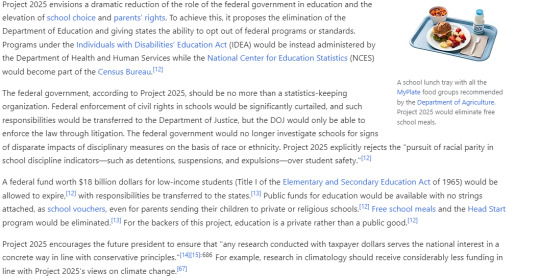
Number 3: Letting states control education. No more nationwide education, every state chooses what it wants to do. Possibility of removing accommodation plans for students who need it, no more free school meals even for free and reduced lunch plans, and the quote "Education is a private rather than a public good."
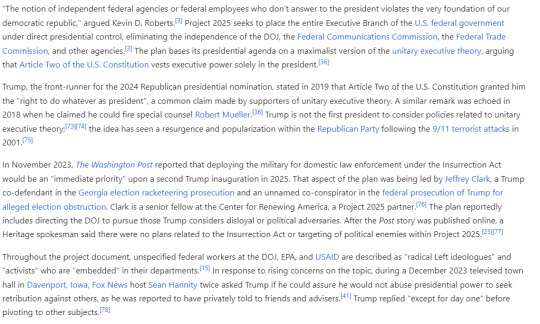
Number 4: Giving the president more power. The branches of government are supposed to balance each other out, make sure no one branch gets too powerful. This will make that a lot harder.

Number 5: Foreign Affairs. Congressional approval would not be required for the sale of military equipment and ammunition to a foreign nation. Also "The word gender would be systematically purged from all USAID programs and documents"???? "Such aid will not be allocated for helping poorer countries address the impact of climate change; rather, it will be devoted to advancing the interests of fossil fuel companies"????

Number 6: Healthcare. Removing Medicare's ability to negotiate medicine prices, denying gender-affirming care to trans people, forcing people to have a nuclear family basically.
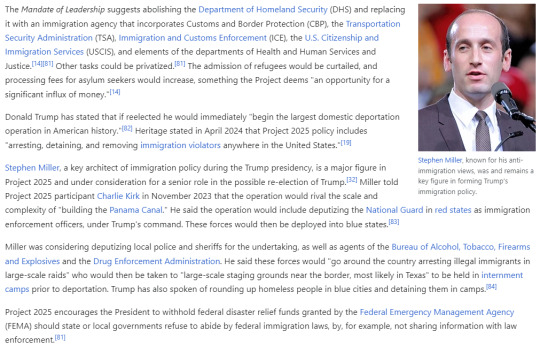
Number 7: All of this bullshit. It's all shit, but please take a look at the last sentence of paragraph 4: "Trump has also spoken of rounding up homeless people in blue cities and detaining them in camps."

Number 8: LGBTQ community. "Proposes the recognition of only heterosexual men and women, the removal of protection against discrimination on the basis of sexual or gender identity, and the elimination of provisions pertaining to diversity, equity, and inclusion (DEI) from federal legislation." "The goal here is to move toward colorblindness and to recognize that we need to have laws and policies that treat people like full human beings not reducible to categories, especially when it comes to race." THEN LET US BE WHO WE ARE. THIS IS THE OPPOSITE DIRECTION OF WHAT YOU ARE SAYING.

Number 9: Banning pornography. Just let people be people. We have needs. Let us be. Especially when Trump had that sneaky link that led him being charged on 34 counts.
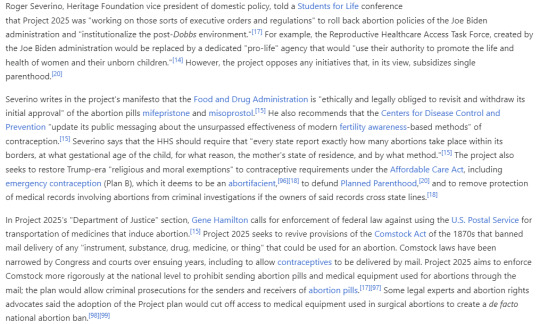
Number 10: Abortion. Are we really going to let white males who don't know where the clitoris is decide what Women get to do with their bodies? You said in the pornography thing that it leads to the exploration of women, but isn't this doing the exact same thing?
In conclusion, Project 2025 would take away numerous rights that we deserve as human beings, including, but not limited to, having a clean environment, the right to an education, access to necessary medication, freedom of expression, sexual media, women's choice with their own bodies, and possibly freedom of religion, one of America's first amendment rights.
I'm scared. I am a queer minor with school accommodations, who has no way out of America.
I don't want to flunk out of high school because my accommodations got taken away from me.
I don't want to have a child at all, let alone before I turn 18 because I got raped and can't get an abortion because of what the government says I can and can't do with my body.
I don't want to be trapped in an area where I can barely breathe because of all the pollutants in the air.
I don't want to be discriminated against, harassed, or dehumanized because of my gender identity and sexuality.
I don't want to be forced to be a Christian.
I'm scared of my own country, and what it could do to me. I don't want to die.
Vote Blue. Or else America could be turned into a suppressive dictatorship.
Note: I will be unpinning this because there have been a lot of comments that make me think I may have said some things wrong in this post. I don't want to completely remove it, because a lot of people have reblogged it to spread information, but I will be removing it from my pin.
#project 2025#election 2024#american politics#us elections#2024 elections#vote blue no matter who#lgbt rights#queer rights#gay rights#education#abortion#environment#enviormentalism#religion#long post#rant#sort of#im scared#america#fuck america#fuck trump#fuck everything#i dont want to die#not like this
158 notes
·
View notes
Text
Gloria Oladipo at The Guardian:
For many students of color, access to an equitable education is dependent on the initiatives and programs provided by the Department of Education. Among its various functions, the department provides targeted funding for low-income students, collects data on educational outcomes and investigates potential bias – essential functions that help underserved students. But such services stand to be disrupted or ended entirely as Donald Trump plans to dismantle the department during his second tenure. In addition to nominating for education secretary the former WWE executive Linda McMahon, who served on Connecticut’s state board of education for one year and has no other notable education experience, Trump has pledged to “[close] up” the department and “return” education rights to the states. Though Trump alone cannot eliminate the federal agency, as such an act requires congressional approval beyond a simple majority, experts have warned that any type of overhaul could disrupt the department’s critical roles, especially for marginalized students.
The education department dates back to 1867; the agency was founded to collect data on schools as states crafted their education systems (Congress abolished the department a year later, fearing federal overreach). In 1980, under former president Jimmy Carter, the department was reconceived as an executive agency with the purpose of ensuring equal education access in primary, secondary and higher education across all states. Historically, the department has overseen the implementation of federal civil rights laws in local school districts, such as the desegregation of schools following the supreme court’s Brown v Board of Education decision. Now, the department coordinates “certain services that states receive, protections, and accountability mechanisms”, said Wil Del Pilar, senior vice-president of EdTrust, an education non-profit. The department also “sets priorities” and can use funding incentives to encourage school districts to work around an issue. “[If] teacher diversity is a focus, [the department] can leverage federal dollars to create a competition for folks to apply for dollars to improve the diverse educator pipeline,” he added.
Investigating civil rights violations is a critical function of the department, carried out by their Office of Civil Rights (OCR). In 2023, OCR received a record 19,201 complaints, according to the department’s annual report, with 45% of complaints relating to sex discrimination. Amid an onslaught of legislation targeting transgender youth last year, the OCR fielded several complaints from LGBTQ+ students against their school districts. Eighteen percent of complaints dealt with race and national origin discrimination, including bullying and racist harassment from school officials. In one high-profile example, the OCR investigated the Jefferson county school district, Kentucky’s largest public school district, and found that Black students were punished more often and more severely than white students. As a result, the district is mandated to amend their disciplinary policies by March 2025.
Following an OCR investigation, the department can force a school to make changes by threatening schools in violation of civil rights. “Funding and enforcement go hand-in-hand,” said Rachel Perera, a fellow at the Brown Center on Education Policy at the Brookings Institute. “The threat of violating civil rights law is that you will lose federal funding.” Absent these checks, schools would have less incentive to comply with the law. Statistics from the department’s civil rights data collection not only provide insight into potential education disparities, including discipline rates by race, but they also determine what funding a school district is eligible for. Title I and Title III initiatives, which provide funding for high-poverty schools and English learners, respectively, are both dependent on enrollment statistics. Eliminating the department all together is an unlikely outcome, experts argue, especially as many of the offices within the department are themselves enshrined into federal law. Prominent Republicans, including former president Ronald Reagan, have attempted to eliminate the department, all to no avail.
[...] Under Trump, the department could be underfunded or further understaffed, and offices such as OCR already struggle to investigate an increasing number of complaints. Disenfranchised students, including students of color and those with disabilities, who rely on Title I funding, would be affected as Trump could make further cuts to the underfunded program. “About 90% of school funding comes from local and state sources, but 10% comes from the federal government,” said Perera. “That 10% is oriented towards poor communities, communities that are disproportionately of color, [where if] that money were to go away overnight, those schools would be in a very difficult position.”
Donald Trump’s plans to abolish the DoE could have very disastrous consequences for students with disabilities, POC, low-income, and/or LGBTQ+.
#Donald Trump#Education#US Department of Education#Trump Administration II#Linda McMahon#Office For Civil Rights#School Discipline#Title III#Title I#Disabilities
53 notes
·
View notes
Text
The Shadows of History: Parallels and Warnings in American Democracy
As a historian, I am acutely aware that while history does not repeat itself, it often presents echoes that serve as warnings for the future. The United States today stands at a crossroads, with certain elements reminiscent of 1930s Nazi Germany and the ambitious plans of Project 2025, raising concerns about the direction in which the country is heading.
The 1930s in Germany were marked by the rise of authoritarianism, a period where democratic institutions were systematically dismantled in favor of a totalitarian regime. The parallels drawn between that era and the current political climate in the United States are not to suggest an identical repetition of events, but rather to highlight concerning trends that, if left unchecked, could undermine the very foundations of American democracy.
**Project 2025 and the Unitary Executive Theory**
Project 2025, a conservative initiative developed by the Heritage Foundation, aims to reshape the U.S. federal government to support the agenda of the Republican Party, should they win the 2024 presidential election. Critics have characterized it as an authoritarian plan that could transform the United States into an autocracy. The project envisions widespread changes across the government, particularly in economic and social policies, and the role of federal agencies.
This initiative bears a resemblance to the early strategies employed by the Nazi Party, which sought to consolidate power and align all aspects of government with their ideology. The unitary executive theory, which asserts absolute presidential control over the executive branch, is a central tenet of Project 2025. This theory echoes the power consolidation that occurred under Hitler's regime, where legal authority was centralized to bypass democratic processes.
**The Erosion of Democratic Norms**
In both historical and contemporary contexts, the erosion of democratic norms is a precursor to the loss of liberty. The United States has witnessed a polarization of politics, where partisan interests often override the common good. The Supreme Court, once a non-partisan arbiter of the Constitution, has been accused of partisanship, with decisions increasingly influenced by political ideologies rather than constitutional law. This shift mirrors the way the judiciary in Nazi Germany became a tool for enforcing the will of the regime, rather than a protector of the constitution.
**The Role of Propaganda and Media**
Propaganda played a crucial role in Nazi Germany, shaping public opinion and suppressing dissent. Today, the media landscape in the United States is deeply divided, with outlets often serving as echo chambers that reinforce ideological beliefs. This division hampers the ability of citizens to engage in informed discourse and make decisions based on factual information, a cornerstone of a functioning democracy.
**Civil Liberties and Minority Rights**
The targeting of minority groups was a hallmark of Nazi policy, justified by a narrative of nationalism and racial purity. In the United States, there has been a rise in xenophobia and policies that discriminate against certain groups. The protection of civil liberties and minority rights is essential to prevent the kind of societal divisions that can lead to the marginalization of entire communities.
**Conclusion**
The parallels between the United States today, Project 2025, and 1930s Nazi Germany serve as a stark reminder of the fragility of democracy. It is imperative that as Americans, we remain vigilant against the forces that seek to undermine democratic institutions and principles. The lessons of history implore us to safeguard the values of liberty, equality, and justice, lest we allow the shadows of the past to shape our future.
As a historian and educator, I believe it is our responsibility to draw upon these parallels not to incite fear, but to inspire action. We must engage in civic education, promote critical thinking, and encourage participation in the democratic process. Only through collective effort can we ensure that the American experiment continues to be a beacon of hope and freedom for the world.
125 notes
·
View notes
Text
2025 Predictions:
- Rachel Reeves gone by the end of the year.
- The Rest Is Politics interview Kamala Harris and / or Michelle Obama.
- Peter Mandelson / other important Labour Party figure is exposed in a leak slagging off Trump. Outrage.
- Keir Starmer hugs Ed Davey and they play FIFA for charity.
- Lee Anderson pornography scandal.
- George Osborne randomly admits he did a fuck load of cocaine at one point in his political career and no one is surprised.
- Right-wing media starts panicking that Keir Starmer is going to make us join the Euro currency, based on absolutely zero evidence.
- Ian Hislop / other big pundit goes viral slagging off Brigit Phillipson’s education policies and she is forced to fight for her job.
- It is revealed that the Tory sleaze was even worse than originally thought. Boris Johnson makes a Nick Clegg-style apology video and it is immediately remixed into a chart-topping banger.
- Wes Streeting cries publicly. He is also accused of bullying within the Labour Party but that is unrelated.
- Kemi Badenoch has an Ed Miliband bacon sandwich moment.
- Israel win the judge’s vote in Eurovision.
- House of Lords reform becomes The Big Thing. Keir Starmer faces rebellion from his own party as some of them quite like being lords. Lib Dems win more public support through this.
- Sir Sadiq Khan scandal. Labour Party refuse to acknowledge it and bring up Tory COVID parties whenever it’s mentioned.
- Someone makes a Rory Stewart documentary and suggests that he *was* a spy.
- Nigel Farage is videoed saying he doesn’t care about how much the British people are suffering so long as they continue to vote for him. His supporters either defend him and accuse the Left of not being about to take a joke or defect to another far-right party.
- Daisy Cooper dabs / flosses / does a TikTok dance.
- A petition to ban Donald Trump from the UK reaches five million signatures. It fails to change anything, but the Liberal Democrats and the Greens lead a protest of over a million people through the streets of London.
- Trump says he loves the English people but he’s not so keen on the Pakistanis and the Welsh.
- Ed Balls has a massive argument with Rachel Reeves on Good Morning Britain. He is accused by Centrists in the Labour Party of being “a traitor” and “a bad husband”.
- Someone shits themselves in the House of Commons.
- Tony Blair says something about trans people again / is photographed with JK Rowling. In response, Gordon Brown comes out with his unequivocal support for trans people everywhere.
- Ed Miliband paints his nails.
Feel free to add your own predictions !! I’d love to hear what everyone thinks :)
#happy new year#!!#this was so fun to do but most of it is a joke#I think some of these things would be pretty funny tho#uk politics#politics#keir starmer#rachel reeves#the rest is politics#gordon brown#tony blair#ed miliband#tbgb#ed balls#donald trump#ed davey#daisy cooper#nigel farage#sadiq khan#eurovision#kemi badenoch#ian hislop#peter mandelson#kamala harris#michelle obama
30 notes
·
View notes
Text
Project 2025 is the republicans' plan to turn the USA into a dictatorship if Trump, or any other republican candidate, wins this year's election. It's policies (all images are from there, links from r/Defeat_Project_2025) include:
Expand presidential powers and use religion to shape laws
Fire 50K federal workers and hire loyalists instead
Make affirming a trans child's gender count as abuse, outlaw p*rnographic material and equate LGBTQ+ content as p*rn
Try to ban birth control and contraception
Decry single moms
Rollback climate change protactions
Replace equality measures with 'anti white racism' laws
And this is only some of the things that I can link to without going over the link limit! Check the 'policies' link for PDFs of 'The Mandate For Leadership', which perfectly explain what Project 2025 is about!
Please, vote for Blue this year to prevent Trump from winning. You are not voting for just one person, but for an entire administration that will rule what's probably the most inffluential country in the world for the next 4 years. And it's also important to know that Trump has said that he want to 'crush pro-palestine protests'. Just an extra thing that I wanted to add.
If you want to help stop this, go join Stop The Coup 2025 to help educate people, and check the aformentioned r/Defeat_Project_2025 for additional resources that I can't link to! (also change the 'www' to either 'new' or 'old' to change the layout to something better).
Organize with your friends to protest and find flyers online to put everywhere you can so that more people may know about this! reblog this post to make more people see it! Get in contact with your local democrats and vote for them everywhere you can, even outside of the presidential elections!
We can't let Trump win this year or any other, because he and the entire republican party won't be kind on anyone who doesn't fit their worldview.
If we fight together, then we can win!
#project 2025#usa#trump is a threat to democracy#usa politics#lgbtq#biden 2024#stop the coup 2025#donald trump#democrats#republicans#climate crisis#transgender#protest#joe biden#united states#politics
62 notes
·
View notes
Text
i guess it’s a little late for this but i have to say it anyway. not voting was never an option.
yes, the biden admin were a bunch of genocidal fucking maniacs, and kamala harris was a part of that administration.
but you are fooling yourself if you believe trump would be a "friend" to gaza or its citizens. his past policies and actions proudly tell us the story of why he’s a terrible fit if your concern is actually support for palestinian rights or humanitarian aid.
1. pro-israel bias: trump’s track record in the middle east is all about heavily favoring israel. he recognized jerusalem as israel’s capital, moved the u.s. embassy there, and stopped u.s. support for palestinian authorities when they opposed this move. he didn’t stop at leaders; he had no issue making life difficult for ordinary palestinians, as his administration also slashed aid to critical areas like healthcare and education. source
2. proposed “deal of the century”: the trump admin’s idea of a “peace” plan was, well, not actually a peace plan at all if you were palestinian. it offered palestinians limited autonomy and what could only be referred to as bribes, while allowing israel to colonize more of the west bank. this plan was entirely about satisfying israeli interests while refusing to address palestinian rights and autonomy. essentially, his idea was for palestinians settle for limited sovereignty in a state under israeli control… in exchange for money. source
3. cutting humanitarian aid to gaza: under trump, there were major cuts in humanitarian aid that massively affected life in gaza. basic needs like medical supplies, food, and education took a major hit. gaza’s already vulnerable communities saw conditions worsen because of these cuts, which came quickly after the opposition of palestinian authorities regarding his delegating jerusalem as the israeli capital. source
4. racist and anti-arab remarks: we all know trump has a long history of racist, anti-arab statements that add to why he’s probably not the person you think he will be for arab or palestinian causes. he has proposed enacting a muslim ban on multiple occasions, and actually attempted to put an executive order in place banning people from muslim majority countries from entering the question at one point. source
i could go on and on, but all in all, trump's past policies and proudly anti arab rhetoric lean overwhelmingly toward the fact that he has and would continue to support israel and blatantly disregard palestinian rights. he is not likely to change his approach.
let’s talk about what the decision not vote and to allow trump to win by default really means for marginalized communities. yes, there’s justified anger with the current administration’s actions regarding gaza. but again, trump, with his track record and policy history, isn’t the better choice for president. here’s why.
abortion rights: in his first term, trump appointed three conservative supreme court justices, which have direct correlation to the overturning of roe v. wade, which put abortion rights back in the hands of states. for millions of women, afab people, and people in need of reproductive care, this has put up huge barriers to essential health services. in some cases, traveling out of state for an abortion is the only option and yet, is often criminalized. source
lgbtq+ protections: trump’s policies put lgbtq+ rights at serious risk. he previously pushed for policies that limited protections for transgender people, from military service bans to “religious freedom” laws that made discrimination legal. some extreme and conservative justices are even willing to revisit obergefell v. hodges, which legalized same-sex marriage. i would strongly encourage familiarizing yourself with project 2025. source 1 // source 2 // source 3
environmental impact: trump’s environmental policy focused on industry over climate. he withdrew the u.s. from the paris agreement— and would do it again! he changed emissions standards and environmental rules, and has repeatedly brushed climate change off as a mere hoax. source 1 // source 2
there is undoubtedly blood on kamala harris’ hands. but do not fool yourself into thinking that donald trump will lift a finger to help gaza when he doesn’t even cate about the rights of minority americans. if either party will make an effort to change things in gaza, it’s harris, even if the effort is fucking half assed.
not voting is a privilege and it’s one we don’t really have if we’re thinking about the communities directly impacted by these policies. this election isn’t about being fucking happy. you can pick the lesser of the two evils and be unhappy with it. you can be pissed that we have to settle for an awful, genocidal person, but this isn’t the time to make your point because all it’s doing is harming people, and there is clearly a less evil side. this is about preventing harm, safeguarding rights, and ensuring vulnerable groups aren’t left defenseless against harmful policies.
27 notes
·
View notes